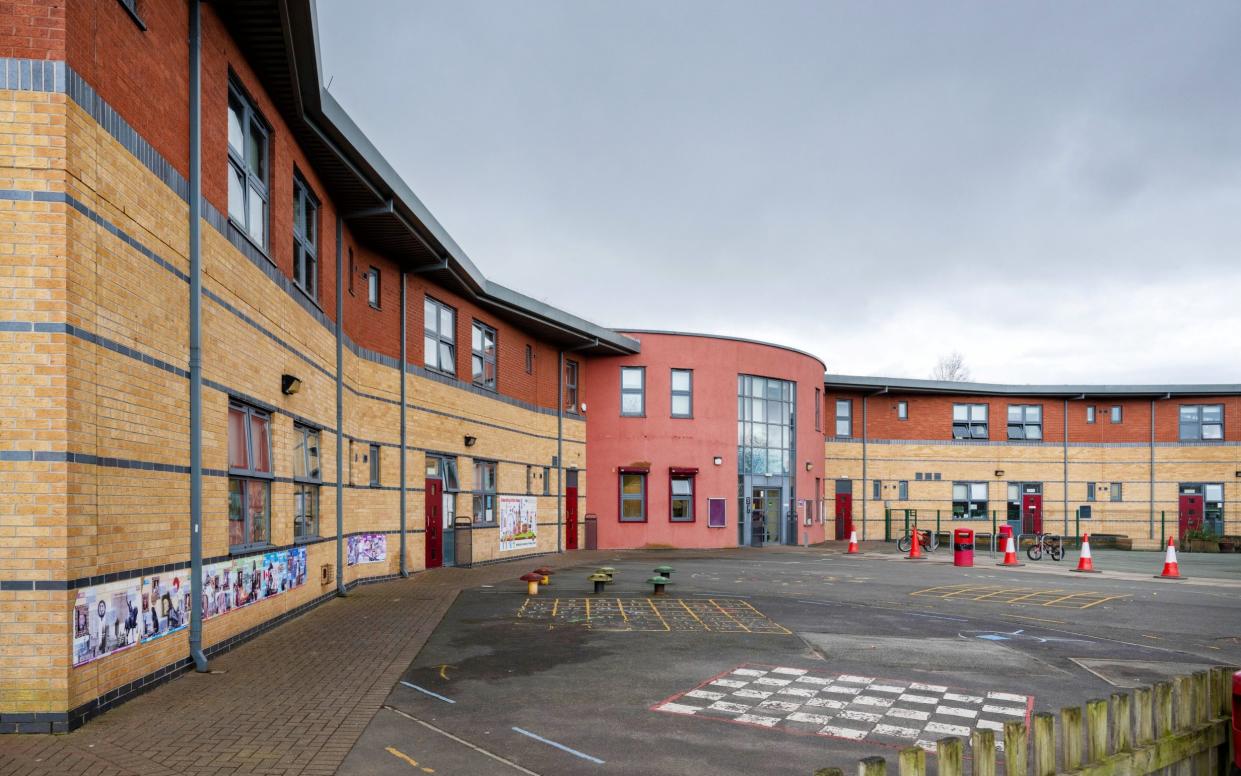The scandal forcing schools to cut grass rather than hire teachers

Head to Middlefield Primary School in Speke, Liverpool, and you will see little on the surface to complain about. The buildings are well-maintained, the toilets rigorously scrubbed, and the playing field grass mown to the precise length of 2.5cm.
But the immaculate appearance – and particularly the grass length, which cannot grow to a millimetre above – is not due to an overly scrupulous headteacher or caretaker.
It is, in fact, all part of the many “ridiculous” and “damaging” rules stipulated in the school’s private finance initiatives (PFI) contract, which was set up when the school was built in 2001.
“Come rain or shine, the grass has to be cut,” says headteacher David Potter. “It can’t go a millimetre over, even when it’s winter and the playing field is hardly used. If it does, the maintenance company gets fined by the private financiers.
“But it’s a ridiculous rule. We should be able to say we can do without it. And the cost of it is daylight robbery. The grounds maintenance alone comes to around £30,000 a year.”
The school is one of roughly 900 in England built through PFI contracts before the initiative was scrapped in 2018. Most of these deals were arranged under Tony Blair’s Labour government of 1997-2007, and were viewed as a way to build public buildings without the taxpayer having to finance the initial cost.
Under the scheme, a private company would pay for the initial school build – but the school would then be tied into a 25- or 30-year contract for the management of its site, grounds, maintenance and cleaning.
In theory, it means PFI schools are in good working order when the contract ends. But many heads – some now more than 20 years into their contracts – are complaining that the rules they must follow are “ridiculous” and overly expensive.
A particular problem is that any decisions that a head might typically make have to go through the PFI, something which Potter finds “incredibly frustrating”.
“The contract controls everything we do,” adds Potter. “We are not allowed to put up posters. And if we want any building work done, we have to use the firm specified in the contract, which is so overpriced and has a 15 per cent fee on top.

“We don’t need the things they do – like cleaning every room every day when they’ve not even been used. If I want to ask the groundsman to do anything, like set up chairs for assemblies, I’m not technically allowed to do it as he doesn’t work for me, but the PFI company. And if we get anything new done, say a new plug socket, they increase the annual service charge.”
Middlefield School is run by an asset management company called Semperium, which employs maintenance firm Dalkia to undertake any work on the school. The contract is set to run until 2031.
But Potter says the rigid rules of the contract are compounded by its price. The contracts are tied to the Retail Price Index, a typically higher measure of inflation no longer used as an official government measure. This means they go up significantly more each year than the allotted school budget.
For instance, in 2021- 2022, his school paid £320,968 for the PFI, roughly 14 per cent of the school budget. For this academic year (2023-2024), Middlefield’s budget is £2.5million, but the payment to the PFI firm will be roughly £500,000, some 20 per cent.
“In theory, PFI contracts are a great idea,” says Potter. “They were set up to ensure that schools could be built and would be kept in good condition until they were given back to the council.
“The problem is that schools have been tied into them, and the cost of them goes up each year when the school budget doesn’t increase. This means the ridiculous amount of cleaning and grass cutting becomes more and more of an issue.
“We are left with less and less money each year and soon we won’t be able to function. The school soon won’t be financially viable. We won’t be able to buy a book or a Pritt Stick.”
He feels that he has made as many savings as possible in the school. Since 2020, he has not replaced four members of staff, including an assistant head teacher and teacher assistants. He also has no power to renegotiate the PFI deal, as it is done with Liverpool City Council.
He adds: “The PFI is the only area where we could make savings, but we are not allowed to do this.
“We are just banging our head against a brick wall. And they don’t justify the costs. There is no receipt of what they have done. It is not transparent.”
In Liverpool, there are 13 primary schools and three secondary schools run by PFIs. At another nearby school, Broad Square Primary School in Liverpool, there are similar problems. The school was built in 2002, with a 30-year PFI contract. The annual fee to the PFI company is £487,000 which is more than 20 per cent of the school’s budget.
“Like all schools on these contracts, the groundsmen come out and cut the grass when it simply doesn’t need doing,” says headteacher Charlotte Foden. “And I have been heavily penalised for doing building work, where I have paid well over the odds. It’s a noose around my neck.”

Recently, the school needed eight partition walls put up, to help provide better learning areas for the growing number of children with special needs who struggle with noise. “These eight partition walls cost me £36,000 as I had to use the PFI company,” she says. “They are not even brick walls. It is simply ridiculous.”
In recent months, she also needed to fit a glass panel into a door for safeguarding reasons. But she said the PFI contract meant she paid £1,430.83 plus a fee of £107.31, so £1,538.14 in total. “In another school, I could get quotes and get the work done so much cheaper,” says Foden. “I believe that if I could choose my own contractors, and wasn’t tied to this PFI contract, I could save the school around £180,000 a year.”
While some schools agree that the maintenance carried out is of high spec, other schools have also had problems of poor service from the PFI contractors.
According to Matthew Topham, of campaign group We Own It, which pushes for public ownership of services and companies, schools are left at the whim of the PFI company, be them good or bad.
He says: “PFIs mean schools are tied into having maintenance done by a set company, which is not value for money. This is about private finance, not about good quality service or public scrutiny. Heads are tied into deals where they can’t even see the original terms and contracts. In some schools, teachers are reduced to tears because of the state of their classrooms, which they can do nothing about. It impacts teacher wellbeing, and as a consequence, the wellbeing of the children.”
At Newman RC College in Oldham, a large secondary school that was opened in 2012, costs are also spiralling. Headteacher Glyn Potts told the BBC the school has been beset by problems with the roof that the private contractor has not fixed. Bursting radiator pipes have also repeatedly flooded classrooms.
“I have to go to those parents and say I’m doing the very best by them with no impact,” he said. “You feel like a failure.”
Other headteachers in England have said they have been advised against speaking publicly about the pressures PFI costs are causing, because of non-disclosure agreements that are built into the contracts.
In early February, Stoke-on-Trent City Council held a meeting in private with the 88 PFI schools in the city. The schools had all been warned they faced double-digit percentage increases in their PFI costs.
A spokesman for Liverpool City Council said that the pressure of inflation on PFI facilities was a national issue. They added that any costs saved to schools through renegotiating the PFI contracts would be cancelled out by legal costs.
Meanwhile, the Department for Education blamed the former Labour government and said it was increasing support for schools in PFI contracts by 10.4 per cent in the coming financial year.
A spokesman said: “These expensive Local Authority Private Financed Initiative (PFI) contracts are a hangover from the last Labour government that are still costing taxpayers.”
They are indeed, and until they are broken, they are costing our children their education, too.
The Telegraph contacted Semperium, Stoke-on-Trent Council and Dalkia for comment.


